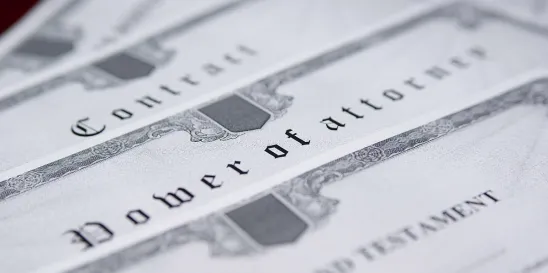At some point in our lives there may come a time when we need to rely upon another individual to assist us with managing our finances, managing our healthcare, or simply helping us with daily tasks. One question that typically arises concerns what is the best arrangement to enter into that will allow someone to assist you under such circumstances. The most common answer would be the execution of a power of attorney. Aside from a power of attorney, however, a guardianship may be more appropriate under certain circumstances. The purpose of this article is to discuss a few differences between these two distinct arrangements.
In general, a power of attorney is a written instrument pursuant to which the principal authorizes another individual to undertake actions on their behalf which typically involves their finances, real estate, or other real property. At times, people may also execute a health care power of attorney which allows another to make decisions concerning their health care or treatment. At the time the power of attorney is executed, the principal must be competent in order to enter into the arrangement whereby they grant a third party the discretion which is set forth in the instrument. The format, as well as the discretion allowed in a power of attorney, can vary greatly and is entirely dependent upon what the person issuing the power of attorney is willing to grant. As such, these agreements can be narrowly tailored to fit the circumstances for which they might be required. Once the power of attorney is executed, it can be utilized while the individual remains competent, or can or it can take effect should the principal becomes incompetent.
On the other hand, a guardianship is sought during a court proceeding during which an individual seeks to become the guardian for the alleged incapacitated person. In order for guardianship to be granted, it must be demonstrated that the alleged incapacitated person is incapacitated, and further, that they require the care or assistance of the person who is seeking to be guardian. There are also varying levels of guardianship and the application to the court may specifically depend upon whether the person needs a complete guardianship, or a lesser level of guardianship, such as a conservator to protect the assets of this individual. Once a person is installed as guardian, they essentially step into the shoes of the incapacitated individual and may take actions on their behalf. The guardian, however, remains subject to review by the court and can be removed for cause if there is an abuse of these powers. During a guardianship proceeding, other individuals may wish to become the guardian of the alleged incapacitated person, and thus, they have the right to either contest the proceeding or to seek to become guardian themselves. This process differs from a power of attorney whereby the power of attorney is designated by the principal prior to the time of incapacity.
It is not unusual when individuals execute powers of attorney that they specifically designate who they wish to serve as their guardian should they become completely incapacitated, or in the context of a guardianship proceeding. Generally, it is our recommendation that a power of attorney be prepared by a person prior to the time that they may become incapacitated in order to deal with any future contingencies. It is also suggested that this power of attorney designate the potential guardians should they become incapacitated. On the other hand, if a sudden incapacitation arises due to an unfortunate event, then the only option would be to seek a guardianship as discussed above. Under either circumstance, however, the person who is acting on behalf of the incapacitated person owes them a fiduciary duty to act in their best interest. When acting as a fiduciary, you should be aware that certain requirements are mandated by statute and must be closely adhered to.
Should you wish to grant a power of attorney to another, or should you be a person seeking a guardianship on behalf of an alleged incapacitated person, it is strongly suggested that you consult with competent counsel. The attorney will be able to advise you as to not only the process, but moreover, your rights and responsibilities with regard to same. Depending upon the circumstances, one relationship may be preferable to the other.



 />i
/>i


